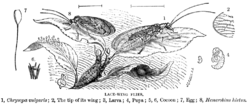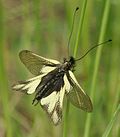(Undid revision 157371259 by 198.151.12.8 (talk)) |
(Lacewing life cycle) |
||
| (3 intermediate revisions by the same user not shown) | |||
| Line 15: | Line 15: | ||
see text | see text | ||
}} | }} | ||
| − | |||
The [[insect]] [[order (biology)|order]] '''Neuroptera''', or net-winged insects, includes the [[lacewing]]s, [[Mantidfly|mantidflies]], [[antlion]]s, and their relatives (the group that was once known as the '''Planipennia'''). The order contains some 4000 species. Traditionally, the order also included [[alderfly|alderflies]], [[fishfly|fishflies]], [[dobsonfly|dobsonflies]], and [[snakefly|snakeflies]], but these are now generally considered to be separate orders (the [[Megaloptera]] and [[Raphidioptera]]). Sometimes the name '''Neuropteroidea''' (syn. Neuropterida)<ref>http://mail.bio.pu.ru/win/entomol/KLUGE/nom/Neuropteroidea.htm</ref> is used to refer to these three orders as a group. | The [[insect]] [[order (biology)|order]] '''Neuroptera''', or net-winged insects, includes the [[lacewing]]s, [[Mantidfly|mantidflies]], [[antlion]]s, and their relatives (the group that was once known as the '''Planipennia'''). The order contains some 4000 species. Traditionally, the order also included [[alderfly|alderflies]], [[fishfly|fishflies]], [[dobsonfly|dobsonflies]], and [[snakefly|snakeflies]], but these are now generally considered to be separate orders (the [[Megaloptera]] and [[Raphidioptera]]). Sometimes the name '''Neuropteroidea''' (syn. Neuropterida)<ref>http://mail.bio.pu.ru/win/entomol/KLUGE/nom/Neuropteroidea.htm</ref> is used to refer to these three orders as a group. | ||
The adults of this order possess four membranous wings, with the forewings and hindwings about the same size, and with many [[vein]]s. They have chewing mouthparts, and undergo complete [[Metamorphosis (biology)|metamorphosis]]. Most are predatory, but a few exceptions occur. | The adults of this order possess four membranous wings, with the forewings and hindwings about the same size, and with many [[vein]]s. They have chewing mouthparts, and undergo complete [[Metamorphosis (biology)|metamorphosis]]. Most are predatory, but a few exceptions occur. | ||
| + | |||
| + | == Life cycle == | ||
| + | |||
| + | Green lacewings lay eggs which hatch larvae called aphidlions. Green lacewing larvae are predators, and can eat hundreds of aphids and other insects at a surprisingly rapid pace. Thus they have been used with increading popularity as a method of biological control, particularly as an alternative to the use of pesticides. They are available from a number of commercial distributors but are also found in nature where favorable climate conditions prevail. | ||
| + | |||
| + | Brown lacewing larvae cover themselves in debris and dead insects as camoflague and are sometimes called trashbugs. | ||
== Taxonomy == | == Taxonomy == | ||
| Line 71: | Line 76: | ||
<center><small>Partial phylogeny of the order.<ref>Oswald, John D. 1995. Neuroptera. Lacewings, antlions, owlflies, etc. [http://tolweb.org/Neuroptera/8220/1995.01.01]</ref></small></center> | <center><small>Partial phylogeny of the order.<ref>Oswald, John D. 1995. Neuroptera. Lacewings, antlions, owlflies, etc. [http://tolweb.org/Neuroptera/8220/1995.01.01]</ref></small></center> | ||
{{userboxbottom}} | {{userboxbottom}} | ||
| − | [[Image:LacewingsLyd.png |250px|thumb|Life cycle of lacewings]] | + | [[Image:LacewingsLyd.png|250px|thumb|Life cycle of lacewings]] |
*Superfamily [[Coniopterygoidea]] | *Superfamily [[Coniopterygoidea]] | ||
**Family [[Coniopterygidae]]: dustywings | **Family [[Coniopterygidae]]: dustywings | ||
| Line 97: | Line 102: | ||
== References == | == References == | ||
| − | + | {{reflist}} | |
*{{cite book|author=[[David Grimaldi|Grimaldi, D.]] and [[Michael S. Engel|Engel, M.S.]] |title=Evolution of the Insects|year=[[2005]]|publisher=[[Cambridge University Press]]|id=ISBN 0-521-82149-5}} | *{{cite book|author=[[David Grimaldi|Grimaldi, D.]] and [[Michael S. Engel|Engel, M.S.]] |title=Evolution of the Insects|year=[[2005]]|publisher=[[Cambridge University Press]]|id=ISBN 0-521-82149-5}} | ||
| − | ==External | + | ==External links== |
| − | [http://www.metafro.be/neuroptera/collection Illustrated database of Neuroptera (insects)] | + | * [http://www.metafro.be/neuroptera/collection Illustrated database of Neuroptera (insects)] |
<gallery> | <gallery> | ||
| Line 118: | Line 123: | ||
[[de:Netzflügler]] | [[de:Netzflügler]] | ||
| + | [[et:Võrktiivalised]] | ||
[[es:Neuroptera]] | [[es:Neuroptera]] | ||
[[fa:بالتوریها]] | [[fa:بالتوریها]] | ||
| Line 127: | Line 133: | ||
[[ka:ბადეფრთიანები]] | [[ka:ბადეფრთიანები]] | ||
[[lt:Tinklasparniai]] | [[lt:Tinklasparniai]] | ||
| + | [[hu:Igazi recésszárnyúak]] | ||
[[nl:Netvleugeligen]] | [[nl:Netvleugeligen]] | ||
[[ja:アミメカゲロウ目]] | [[ja:アミメカゲロウ目]] | ||
Revision as of 16:25, 16 December 2007
The insect order Neuroptera, or net-winged insects, includes the lacewings, mantidflies, antlions, and their relatives (the group that was once known as the Planipennia). The order contains some 4000 species. Traditionally, the order also included alderflies, fishflies, dobsonflies, and snakeflies, but these are now generally considered to be separate orders (the Megaloptera and Raphidioptera). Sometimes the name Neuropteroidea (syn. Neuropterida)& is used to refer to these three orders as a group.
The adults of this order possess four membranous wings, with the forewings and hindwings about the same size, and with many veins. They have chewing mouthparts, and undergo complete metamorphosis. Most are predatory, but a few exceptions occur.
Life cycle
Green lacewings lay eggs which hatch larvae called aphidlions. Green lacewing larvae are predators, and can eat hundreds of aphids and other insects at a surprisingly rapid pace. Thus they have been used with increading popularity as a method of biological control, particularly as an alternative to the use of pesticides. They are available from a number of commercial distributors but are also found in nature where favorable climate conditions prevail.
Brown lacewing larvae cover themselves in debris and dead insects as camoflague and are sometimes called trashbugs.
Taxonomy
Template:Userboxtop Template:Clade
- Superfamily Coniopterygoidea
- Family Coniopterygidae: dustywings
- Superfamily Ithonioidea
- Family Ithonidae: moth lacewings
- Superfamily Hemerobioidea
- Family Chrysopidae: green lacewings, stinkflies
- Family Dilaridae: pleasing lacewings
- Family Hemerobiidae: brown lacewings
- Family Polystoechotidae: giant Lacewings
- Family Psychopsidae
- Superfamily Osmyloidea
- Family Osmylidae
- Family Neurorthidae
- Family Sisyridae: spongillaflies
- Superfamily Mantispoidea
- Family Berothidae: beaded lacewings
- Family Mantispidae: mantidflies
- Superfamily Myrmeleontoidea
- Family Palaeoleontidae
- Family Ascalaphidae: ascalaphids, owlflies
- Family Myrmeleontidae: ant-lions
- Family Nemopteridae: spoonwings
- Family Nymphidae
References
- ↑ http://mail.bio.pu.ru/win/entomol/KLUGE/nom/Neuropteroidea.htm
- ↑ Oswald, John D. 1995. Neuroptera. Lacewings, antlions, owlflies, etc. [1]
- Grimaldi, D. and Engel, M.S. (2005). Evolution of the Insects. Cambridge University Press. ISBN 0-521-82149-5.
External links
- Ameisenjungfer.jpg
Euroleon nostras, an ant-lion
Template:Wikispecies Template:Wikibookspar
de:Netzflügler et:Võrktiivalised es:Neuroptera fa:بالتوریها fr:Neuroptera ko:풀잠자리목 hsb:Sytkokřidłač it:Neuroptera he:מרושתי כנף ka:ბადეფრთიანები lt:Tinklasparniai hu:Igazi recésszárnyúak nl:Netvleugeligen ja:アミメカゲロウ目 no:Nettvinger pl:Sieciarki pt:Neuroptera sl:Pravi mrežekrilci sv:Nätvingar zh:脈翅目



